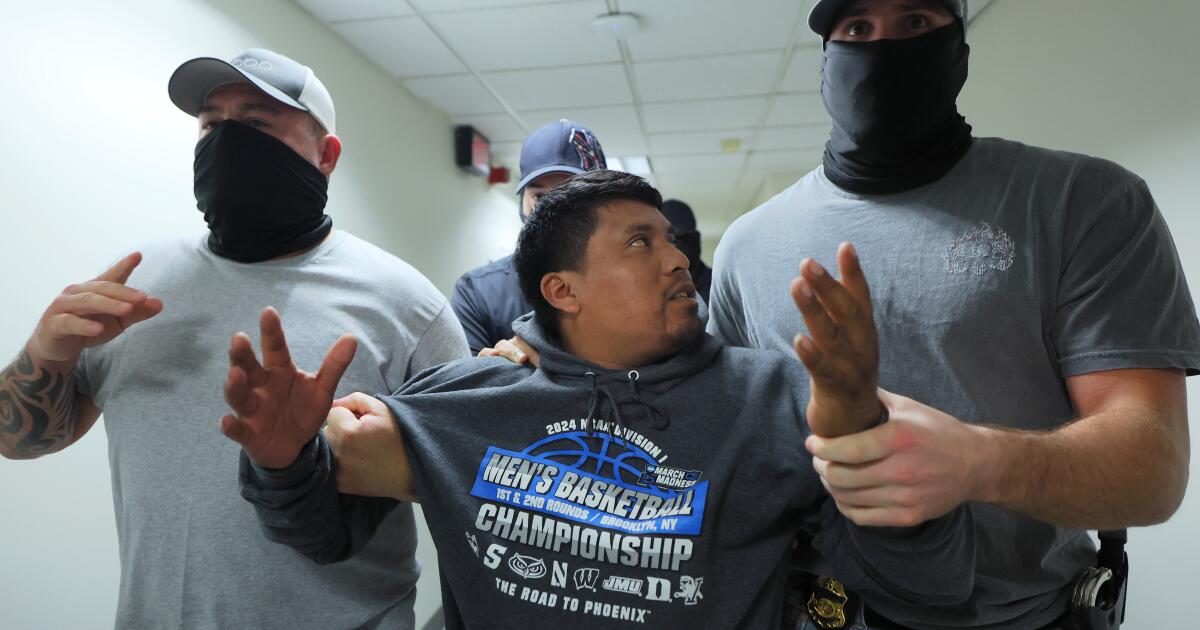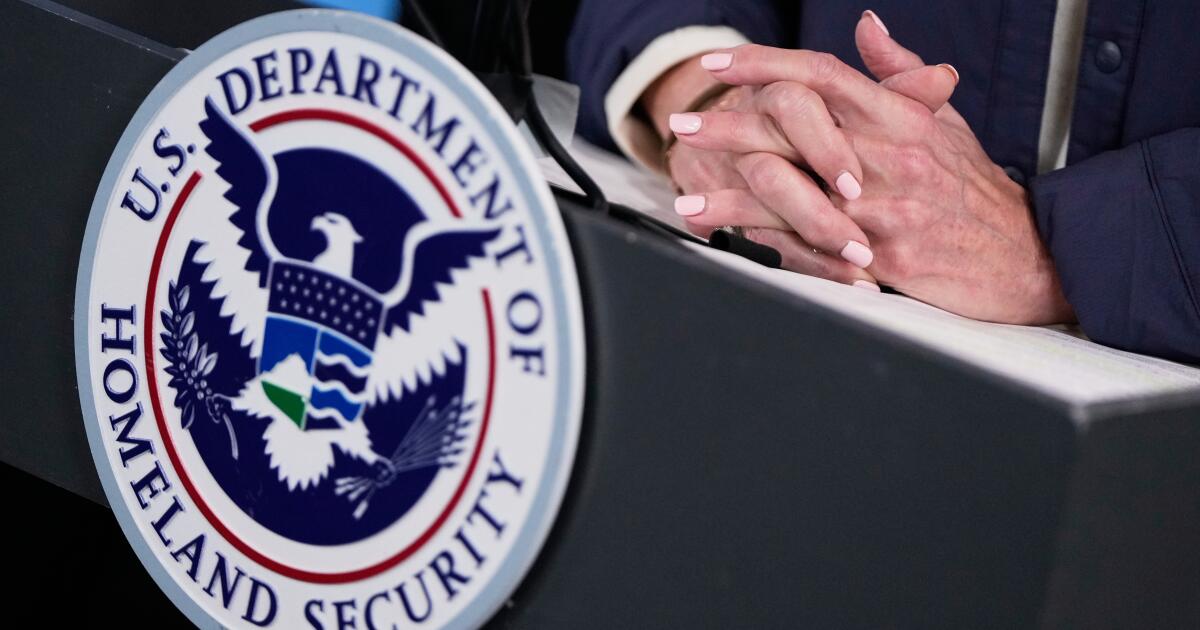Asylum approvals plummet as fearful immigrants skip hearings
WASHINGTON — A year into the Trump administration’s ratcheted-up mass deportation effort, approval rates for asylum seekers have plummeted as immigrants are too afraid to show up for court hearings.
Fewer than 3% of asylum cases decided in January were approved — a record low, according to Mobile Pathways, a San Francisco nonprofit that analyzes federal immigration data. That’s compared with an 18% approval rate in January 2025.
Nationally, 20% of immigrants seeking asylum missed their hearings in January, compared with half that rate a year earlier. Asylum seekers with pending applications are in the country legally, but under federal law, failing to appear for a hearing can result in a deportation order.
In Los Angeles County immigration courts — among the largest in the country — the trend is substantially starker: no-shows made up 56% of the asylum hearings in January, compared with 14% a year earlier.
“That’s not fluctuation,” said Bartlomiej Skorupa, chief operating officer of Mobile Pathways. “That’s collapse.”
A Justice Department spokesperson said the Trump administration is restoring integrity to immigration courts.
As of December, nearly 3.4 million cases were pending in immigration courts, with more than 2.3 million of them asylum cases, according to TRAC, a data research organization.
The rise in the number of people avoiding asylum hearings helps explain another trend in the immigration court system. Over the last year, the number of asylum cases marked “abandoned” has doubled.
Immigration attorneys say cases can be classified as abandoned for various reasons: An applicant missed a deadline, filled out a form incorrectly, or just decided to leave the U.S.
But the Executive Office for Immigration Review, the agency that administers immigration courts, can label a case abandoned if the applicant fails to show up for a hearing. Nationwide, the number of cases considered abandoned doubled over the last year to make up about 41% of those decided in January.
It takes an average of four years for immigrants to receive an asylum hearing, though a final decision can take longer with appeals, according to the Migration Policy Institute, a nonpartisan think tank.
During the Biden administration, most asylum claims were not issued decisions by an immigration judge; instead, many were administratively closed, or paused and taken off judges’ dockets. While the case is inactive, the person can remain in the U.S., work legally and pursue other avenues of relief.
But such a policy is vulnerable to being reversed by a subsequent administration, Migration Policy Institute experts wrote in a November report.
Lindsay Toczylowski, co-founder of the Immigrant Defenders Law Center in Los Angeles, said the increase in no-shows is in part because the Trump administration began reopening asylum cases that had been administratively closed for many years.
Many of those people are no longer in contact with their attorney, if they had one, and would be difficult to notify of a new hearing.
A decade ago, a significant portion of asylum seekers came from El Salvador, Guatemala or Honduras, many of whom settled in Southern California.
Since President Trump returned to the White House, Los Angeles was one of the earliest cities where federal agents began arresting immigrants at courthouses. Immigrants have become afraid to engage with any law enforcement authorities, Toczylowski said.
The government’s goal, she said, “is not due process or pursuing justice for people in immigration courts — it’s deportation orders. If people don’t show up in court, that’s a way for them to meet their metrics.”
Immigration courts are housed within the Department of Justice and judges have long complained that they lack full independence from executive branch overreach. The department disputes that, saying judges are independent adjudicators who decide cases individually.
More than 100 immigration judges have been fired since Trump took office and about the same number have resigned or retired, according to the union representing immigration judges. That’s down from 735 judges in last fiscal year.
Last summer, the Pentagon authorized up to 600 military lawyers to work for the Department of Justice after removing the requirement for temporary immigration judges to have immigration law experience.
Jeremiah Johnson, a former immigration judge who was fired last year from the San Francisco Immigration Court, said the 3% asylum grant rate in January is shockingly low.
Johnson, who was vice president of the National Assn. of Immigration Judges, said decisions by the Board of Immigration Appeals throughout the last several months have limited asylum law. Immigration judges must abide by the precedent set in those cases.
One such case, for example, reverses prior interpretations to now limit gender-based asylum, finding that persecution claims based solely on gender, or gender combined with nationality, don’t generally don’t meet the definition of a “particular social group” — one of the five categories under U.S. asylum law.
Another factor contributing to lowered asylum approvals, he said, is that the federal government has started seeking to dismiss asylum cases by forcing migrants to start over in a “safe third country.”
These requests stem from the increasing number of so-called asylum cooperative agreements, which allow federal officials to send certain migrants to other countries — including less stable places such as Honduras, Uganda and Ecuador — instead of continuing to seek asylum in the U.S.
“It has really been a restriction in the availability for asylum and other related protection,” he said.
Kathleen Bush-Joseph, one of the authors of the Migration Policy Institute report, pointed to a post last month on X by White House Deputy Chief of Staff Stephen Miller, who said that asylum “is limited to individuals fleeing extremely narrow categories of state persecution.”
“None of the groups illegally crossing the border fit that criteria,” Miller wrote. “No one in Mexico or Ecuador or Honduras etc live in nations where there is any state persecution of any protected class.”
But Bush-Joseph cautioned that it’s not yet clear whether the Trump administration’s asylum changes are legal.
“Even though there are executive actions in place that are restricting access to asylum, those are being challenged in court and I don’t think that we know how all of this will turn out,” she said. “A lot of people are being deported in the meantime and they may not get the chance to come back.”

